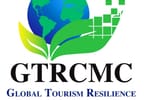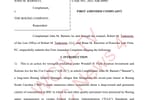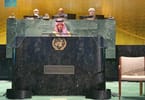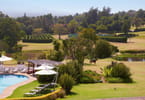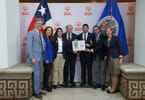Mighty birdsong is the wakeup call visitors can expect when staying at the Paraa Safari Lodge on the banks of the river Nile, although the more conventional method – like a discreet knock on the door while delivering a pot of steaming early morning tea – can also be taken care of after making arrangements with the reception before going to bed in the evening.
I had traveled the previous afternoon from Kampala to the park to attend a site meeting called by Heritage Oil and Gas (U) Ltd. for district leaders and stakeholders and arrived at the lodge after catching the very last ferry, already crossing the river in darkness and the landing only illuminated by the headlines of the final two cars making the trip.
Cold towels and a refreshing chilled fruit juice made the check-in procedure even more pleasant, as I only had to sign the form, with all other information already at hand from previous visits, prompting a cheerful “welcome back” by the reception staff.
Travel from Kampala by road takes approximately 6 ½ hours, including a stop in Masindi for fuel and a quick bite ,which in this case was taken at the beautifully-restored Masindi Hotel. In contrast, a flight from Kampala’s Kajjansi airfield or the main airport in Entebbe takes a mere 45 minutes in a twin engine plane, or an hour in a Cessna Grand Caravan, which I managed to hop on for the trip back home. Paraa Safari Lodge has 4×4 vehicles available for airstrip transfers and also for game drives, to meet guests flying in and Marasa – the management company for the Madhvani owned safari lodges in Uganda – now even offers flying packages for visitors with the desire to spend more time in the park instead on the road – I can only approve of this and highly recommend this mode of travel while on safari.
Since my last visit to the park a couple of months ago, the road between Masindi and the park entrance has been graded again, but I do not want to take credit for this in spite of my stinging criticism at the time to the council, and much of the park road towards the ferry crossing too was recently graded, making for a smooth drive even with a saloon car, although a proper 4×4 is preferable for game drives over at times rather rough tracks in other parts of the park.
I joined a communal dining table with 7 other visitors – the terrace dining section was packed to the brim on a mid-week night – to listen to and partake in the inevitable safari talk and friendly banter over local politics, before retiring to my room which was located on the upper floor. This allowed me to leave the balcony door open to enjoy some fresh air overnight (air condition is available) while the all-encompassing mosquito net took care of a quiet night – until the dawn light began to stir the birds back to life that is.
The river, concealed in darkness the evening before, carried patches of foam downstream past the lodge, which intriguingly disappeared by mid-day, a source for another article to get to the bottom of this unwanted phenomenon and riddle in due course.
But back to the main reason for this story, the decidedly controversial, yet fully-approved oil exploration activity by Heritage inside the park, which in the past had led to some confined sections of the game viewing tracks to be closed for traffic. Subsequently, there has been covert and overt talk, and a range of allegations have been made both in public as well as in private, all of which appear more driven by emotion than by fact, a situation this article hopefully helps to set right.
The Government of Uganda through the Ministry of Energy and Mineral Development, NEMA, and UWA, had given all prerequisite permits and approvals to carry out test drilling inside the park as the oil exploration concession for Heritage covers sections of the national park land. As part of the visit and meetings, selected participants were able to inspect those two sites and ascertain the state of the immediate area and adjudge both vegetation as well as wildlife nearby, all of which was in past months subject to much speculation and rumor mongering.
Although the visitors from the Amuru district administration were late in arriving, the presentations by the Ministry of Energy and Mineral Development (confirming a US$1 billion investment in the sector so far), the environmental consultants contracted by Heritage, staff of the oil company, and notably UWA were still all on course, albeit two hours later than initially scheduled. UWA surprised a few with their declared unconditional support for oil exploration inside “their” park, but national interest clearly must have played a key role in having made this decision. In fact, Heritage has, according to information received on site, since commencing work in the wider area donated a river ferry to UWA, capable of carrying one truck or two cars and then added a 4×4 vehicle and some work-camp buildings, all valued at over US$200,000 – not bad, considering that no such obligation is contractually agreed at this moment in time. I am certain UWA is grateful for such gestures and quietly hopeful for more such material support to assist their park operations.
According to lodge-based sources, only a very few of the safari operators have been particularly vocal against the drilling inside the park, including suggesting and threatening ultimately unsuccessful vague boycotts, while tourist visitors generally showed little interest in the matter, unless when apparently wound up by their respective tour guides promoting their own and their boss’ agenda. They are again quoting the same sources, allegedly the same lot who in the past also shot off broadsides against monopolies over safari park lodges – including targeting the owners of the Paraa Safari Lodge using outright racist sentiments – and who have been the focus of this correspondent’s reporting over other issues broadly concerning the tourism industry in Uganda.
More test drilling is now planned, but as discussions are still ongoing over the schedule of drilling, no drilling work has commenced at this time and is restricted to site preparation. It is understood that Heritage would prefer to test drill at one site while concurrently preparing the next location already for the arrival of the drilling rig, so as to move more quickly from one site to the next and be out of the park much sooner. UWA in turn has pointed out that their preference would be single drilling, before full site restoration – incidentally costing the not insignificant sum of about US$500,000 per site – and only then starting work elsewhere, to leave more of the park area open for game drives, while apparently accepting a longer timeframe of overall activity inside the park. A total of 6 sites have already been approved, with a possible four more should results make this necessary, and this appears equally split between the northern and southern side of the river. These discussions, however, are reportedly nearly concluded and a compromise will undoubtedly be reached to accommodate both parties. What is clear though is that wild rumors, alleging that Heritage would drill on all sites at once, are pure fiction, as only ONE drilling rig is available, which is even shared with Tullow Oil (another oil exploration company partnering with Heritage) on a pre-agreed schedule. Hence, talk about “many years of test drilling in the park” is patently false and deliberately misleading and more than likely aimed to fire up public disaffection and opposition in general to any form of exploiting Uganda’s oil reserves, now estimated to be in the 1+ billion barrels region for confirmed deposits and likely much more as new finds are constantly being discovered. The company in fact estimates that in a best case scenario, they will be through their test drilling schedule between 6-9 months and if they have to settle for the longer option. the work should be completed between 9-12 months.
The debate of the “if at all,” however, is long past and gone – more so as the country cannot afford to leave the oil untouched in favor of exclusively keeping the wonderful landscapes, flora, fauna, and biodiversity intact for just the sake of it, while sitting on multi-billions of US dollars worth of oil and at the same time depending on donor funding to even finance the annual budgets. As long as international best practices are used in all stages along the way and the latest state-of-the-art technology is being employed, as long as mitigating measures for oil exploration and production in and near protected areas are pre-agreed and then strictly adhered to, will it be possible to both exploit the oil, as well as maintain the national parks, game reserves, wetlands, and lakeshores across which the various oil blocks run.
In fact, it is expected that future oil revenues can partly co-finance conservation support measures, especially in the affected areas. An offer is already on the table by Heritage to finance the opening up of new game drive circuits and tracks within Murchisons, an added gift UWA would gladly accept immediately but for which government’s approval for cost recovery is still outstanding now for several months. In fact, upon seeing several tracks towards the test drilling sites, the question is on the table and will hopefully be answered by both UWA and NEMA, why such new tracks should not be extended to end at a more distant waterhole or a nearby hilltop, where a little thatched rondavel could offer shade and a place to have a picnic or bush meal for tourists, as is the case in many of the parks in Kenya and Tanzania. Removing all of these working tracks and restoring them to wilderness may deny the safari operators extra options to take visitors to other sites apart from the few circuits, which at present exist inside the Murchisons. According to UWA sources many safari operators have reportedly demanded to know when the new tracks promised by UWA would finally be availed and these safari operators may wish to take up the matter and lobby for this option. Food for thought for the powers that be, and hopefully they decide wisely on this question without wasting resources and use some creative thinking to keep all parties happy.
An extended visit to the two old test drilling sites conclusively showed that apart from a small structure on each of them, well disguised by the way with only the door visible under which the drilling shafts are sealed, hardly any evidence remains about the rather recent activities of test drilling, as grass and other vegetation has been replanted and is taking root, now that the rainy season is in full swing. There are many bare patches found across the entire park where no vegetation ever took hold or where runoff water has swept the top soil and the plants away, but the sites where the test drilling took place appear well on course to completely overgrow again – and being well off the main roads reveal nothing of the prior activity to visitors from the distance, even when using binoculars or tele lenses.
Bryan Westwood, the head of Heritage in Uganda, was also at Paraa and having known him since his arrival in Uganda in the early 1990s as a straight shooter, this correspondent has no doubt about his following statement: “We will do everything we can to make this the best oil production site Heritage has. I want to come back in the future with my grandchildren, visit Murchisons Falls National Park, and show them what we have done and be proud of it. I want to work with the people here to make this happen.”
Oil revenues, if wisely used, can provide the country with a nationwide comprehensive net of health centers, educational facilities, and a vastly-improved infrastructure, considering the example of how, for instance, Norway used its rich oil resources. It is a fact that Norway has expressed their desire to assist the Ugandan government to move into their direction rather than falling for the booby traps of, amongst others, the Nigerian example and all their associated misdeeds, and indeed share the wealth the oil brings with the entire nation by creating lasting value in infrastructure, health, and education, cornerstones for the success of a developing country. Nigeria’s experience in the Niger delta should, in fact, be a stark warning to the oil companies, the conservation and tourism fraternities, government, and civil society, that utmost care must be taken to protect the environment and mitigate all negative aspects of test drilling and more so when production goes underway. Environmental degradation and wildlife displacement in the Niger delta area has caused a heavy burden on local communities and aided and abetted the radicalization of local people, ultimately resulting in hijackings, hostage takings, murders, and acts of sabotage, which ultimately were not helpful to the justified causes of the locals nor the regulated exploitation of such natural resources. Oil companies, by their very nature, are business and profit orientated, and a strong regulatory regime, close supervision, and the formation of advisory and consultative platforms will go a long way to introduce legally-binding parameters for the oil companies, providing mitigation, accountability, and transparency and avoiding potential conflict of the Nigerian sort. This relationship between Uganda and the foreign oil companies should not and cannot be left to purely voluntary efforts but ought to be in the format of binding agreements with measurable outcomes.
What is important for Uganda is that both the oil business and nature-based tourism can develop in tandem and play a role in the future economic development of the nation, and neither sector should try to get the better of the other. Constant dialogue and honest interaction will go a long way to address concerns of the conservation and tourism fraternity and help to map out a way forward where both parties partner rather than constantly oppose each other. Present experience, especially after the stakeholder workshop and other witnessed interaction of Heritage with affected and potentially benefitting, and/or affected communities, shows that coexistence and partnership is already a reality in regard of relations with local communities and that broad based cooperation, bringing together all concerned parties towards working hand in hand, can achieve this.
In closing, one final comment: none of the other oil companies proved as forthcoming, open, and proactive as Heritage, and it can only be hoped that they, too, eventually come onto the same wavelength and show equal transparency and openness when dealing with the general public and the media. Keeping their dealings a secret will certainly not aid their cause.
For readers interested in more information about this topic, please write to [email protected], attention of Jacob Manyindo Esq., to request for the sending of the Uganda Wildlife Society’s recent report on the same subject raised in this article.
WHAT TO TAKE AWAY FROM THIS ARTICLE:
- Since my last visit to the park a couple of months ago, the road between Masindi and the park entrance has been graded again, but I do not want to take credit for this in spite of my stinging criticism at the time to the council, and much of the park road towards the ferry crossing too was recently graded, making for a smooth drive even with a saloon car, although a proper 4×4 is preferable for game drives over at times rather rough tracks in other parts of the park.
- Paraa Safari Lodge has 4×4 vehicles available for airstrip transfers and also for game drives, to meet guests flying in and Marasa – the management company for the Madhvani owned safari lodges in Uganda – now even offers flying packages for visitors with the desire to spend more time in the park instead on the road – I can only approve of this and highly recommend this mode of travel while on safari.
- Mighty birdsong is the wakeup call visitors can expect when staying at the Paraa Safari Lodge on the banks of the river Nile, although the more conventional method – like a discreet knock on the door while delivering a pot of steaming early morning tea – can also be taken care of after making arrangements with the reception before going to bed in the evening.









